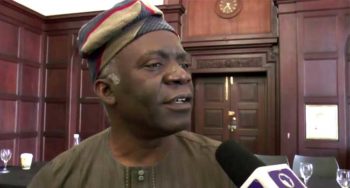
Human rights lawyer Femi Falana SAN has accused the Nigerian National Petroleum Corporation (NNPC) of failing to remit over $20.2bn since the return of democracy in 1999 to date.
He said, “Instead of piling up external loans the federal government should be compelled by the Nigerian people to embark on the immediate recovery and repatriation of hundreds of billions of dollars from the NNPC.”
Falana was speaking today in Lagos at a National Seminar on Promoting Transparency and Accountability in the Recovery of Stolen Asset in Nigeria: Agenda for Reform organized by Socio-Economic Rights and Accountability Project (SERAP) in collaboration with the Ford Foundation, USA.
According to Falana, “Transparency and accountability are interconnected to the application of economic, political and administrative management of the affairs of a state. The exercise of these affairs is that they must be seen to be exercised by the citizens of a state. Where a government parastatal such as the Nigerian National Petroleum Corporation (NNPC) is said to have failed to remit oil revenue to the tune of $20billion, issues of good transparency and governance becomes a crucial issue.
Falana said in his paper that, “The Federal Government has to re-focus its recovery of stolen assets by vigorously pursuing recovery of assets from multinational corporations and not just the countries that illegally keeping the looted wealth of the country. The recovery of our looted wealth should also be extended to the few Nigerians who have been indicted in the Panama and Paradise papers. The EFCC and the Federal Inland Revenue Service should recover appropriate taxes from the offshore companies set up by such individuals.”
Falana called on the government of President Muhammadu Buhari to “comply with the order of the federal high court which has directed the federal government to account for the loot recovered since 1999.”
Falana’s paper read in part “It is undoubtedly clear that the governments of western countries and the United Arab Emirates are not going to co-operate with Nigeria in the repatriation of the nation’s looted unless the Federal government is prepared to adopt appropriate diplomatic and legal measures. In addition, the labour unions and other civil society organizations in the affected countries have to be mobilized to mount pressure on their governments to return our looted wealth.
“Upon the inauguration of the Mohammadu Buhari administration the governments of the United States, United Kingdom and Switzerland assured the federal government that stolen funds and assets stolen from Nigeria would be repatriated. Not only have these countries refused to cooperate with Nigeria they have also frustrated the efforts of the federal government to recover and repatriate such tainted funds and assets.
“In a display of sheer arrogance and hypocrisy in June last year the then British Prime Minister, Mr. David Cameron described Nigeria as “a fantastically corrupt country”. In his reaction to the embarrassing comment, President Buhari asked Mr. Cameron to return the stolen wealth of Nigeria in the United Kingdom.
“The government of the United States has filed copious objections to the suit filed by Nigeria in Jersey for the recovery of over $3oo million of the Abacha loot. The gravamen of the objection is that the fund be released to the United States to manage on behalf of Nigeria.
“In the same vein, Switzerland has insisted that the sum of $321 million of the Abacha loot would not be repatriated to Nigeria unless the World Bank would be allowed to monitor the disbursement of the fund. Such patronizing attitudes of western governments which had cannot be justified having regard to the fact that they had connived with a few unpatriotic Nigerian public officials in the grand looting of the treasury of Nigeria.
“Transparency and accountability in political office imply that elected government officials are conscientious and accountable for their decisions and actions and imbibe integrity, selflessness and neutrality in order to ensure probity in service. Transparency and accountability in public services create confidence in the citizenry in terms of implementing governmental processes to promote the public good.
“Capital flight, illegal exportation of profits, tax evasion through shell companies, currency devaluation and dollarization of the economy are promoted by the Central Bank under the peripheral capitalist system operated by the federal government. The point I am struggling to make is that the limited gains recorded by the Buhari administration in the fight against corruption are a tip of the iceberg view of the massive capital flight that is legitimized by market forces.
“Convinced that the federal government was chasing the shadow in the fight against corruption I have had cause to petition the Economic and Financial Crimes Commission to open the allegations of corruption which border on crimes against humanity. In the said petition I alleged as follows:
“From five cycles of independent audit reports covering 1999-2012 the National Extractive Industries Transparency Initiative revealed that the Nigerian National Petroleum Corporation, some oil companies and certain agencies of the Federal Government have withheld $20.2 billion from the Federation Account.
“In 2006, the Central Bank of Nigeria removed $7 billion from the nation’s external reserves and placed same as deposit in 14 Nigerian banks. In 2008, the Bank gave a bailout of N600 billion ($4 billion) to the same banks. Up till now the CBN has failed to recover the said sum of $11 billion from the banks.
“On September 6, 2016 the Nigerian National Petroleum Corporation (NNPC) announced that arrangements had been concluded to recover the sum of $9.6 billion in over-deducted tax benefits from joint venture partners on major capital projects and oil swap contracts. The NNPC is said to have recovered the said sum of $9.6 billion but has not same remitted same into the Federation Account.”